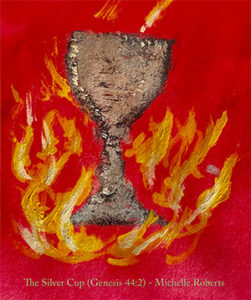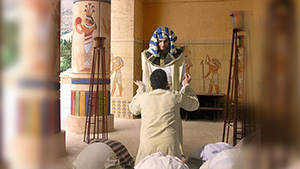 “Now this is not the end. It is not even the beginning of the end. But it is, perhaps, the end of the beginning” – Winston Churchill – 1942
“Now this is not the end. It is not even the beginning of the end. But it is, perhaps, the end of the beginning” – Winston Churchill – 1942
These are the words of Winston Churchill in the early days of WWII. As we complete our study of the book of Genesis, I feel the same way. Genesis (Hebrew – Bereshit) means “in the beginning”. This book provides the foundation for the rest of the Bible. In it we have the creation account, the fall and the early judgment of mankind. I have called these judgments “God’s acts to limit the expression of evil through mankind”. Following these judgments, we have the revelation of the beginning of the redemption process which has now been working out in the human community for 4000 years. Again, Genesis gives us the basic foundation for what will follow. God made a covenant with three successive generations of his elect family: Abraham, Isaac and Jacob. He brought the infant nation (at this point an extended family) into Egypt which served as an incubator for Israel. Finally, God revealed how the two leading tribes, Judah and Joseph, came to be in leadership positions and that ultimate redemption would be accomplished through Judah.
Jacob was approaching death. He was 147 years old and had spent the last 17 years in Egypt. Now Jacob passed on both tribal leadership and the double blessing. Tribal leadership was bestowed upon Judah who had already demonstrated his selfless leadership. He willingly laid down his life for his brother. The double portion was given to Joseph. In order to accomplish this in a meaningful way, Jacob adopted the two sons of Joseph, Ephraim and Manasseh, as his own sons. This is prophetic because the practical implications of it would not be fully realized until Israel conquered its land 400 years later. When the land was allocated to the various tribes, the Biblically meaningful heartland was given to Judah and Joseph. This is the area called today “the west bank”. It is the most highly contested real estate in the world today (see my book “Israel, God’s Interdimensional Portal”, available at Amazon).
One of my favorite Scriptural quotations is found in the section. Jacob declared to Joseph,
“The God before whom my fathers Abraham and Isaac walked, The God who has been my shepherd all my life to this day, The angel who has redeemed me from all evil, Bless the lads….. (Genesis 48:15-16a)
I feel a kinship with Jacob because his confession is also true in my life. As I look back over the years, I realize that the Lord has guided me each step of the way and that he has delivered me from evil along the way.
When Jacob died, he was taken to Hebron and buried in the cave of Machpela. He was the last to be buried in the cave following Abraham and Sarah, Isaac and Rebecca and, finally, his wife Leah. Can you imagine the significance of this site to the remnant of Israel who have returned and possessed the land in our day? My favorite rabbi and friend, Rabbi Eliezer Waldman, led one of two families to return to Hebron in 1968, following the Six-Day war, to establish a Jewish presence there. The ancient Jewish community of Hebron had been annihilated by Moslem Palestinians in 1929. I have had the awesome experience of visiting this site on several occasions.
Finally, Genesis ends with a bold faith expression made by Joseph. Joseph’s was confident that God would deliver Israel from Egypt. He did not know when. He made the sons of Israel promise that when God delivered Israel from Egypt and they returned to the land of Israel, that his bones be taken with them and buried in the land. Four hundred years later in the Exodus from Egypt, this was fulfilled. Joseph body was carried along the way and buried in Shechem near the border between Ephraim and Manasseh. There is a synagogue in Shechem at Joseph’s tomb today. This is also the site of Mt. Ebal and Mt. Gerazim and the community of Kedumim. Fellowship Church, the congregation that the Lord used me to pioneer, has an ongoing project in Kedumim. It is awesome to sit at this site and drink in the historical as well as the future significance of this area.
Between the death of Joseph (Genesis 50) and the birth of Moses (Exodus 1) there is a gap of approximately 280 years. During this period, Egypt was conquered by Semitic invaders known as the Hyksos. Eventually the Egyptians rose up and expelled the Hyksos and established Egyptian rule again. This would be the Pharaoh that did not “know” Joseph and was responsible for enslaving the Hebrews. This is the beginning point for the book of Exodus.
 Judah was faced with the ultimate test of leadership. Benjamin had been found guilty of stealing Joseph’s cup and was destined to be thrown into prison for the rest of his life. Judah approached Joseph and proposed that he be imprisoned in the place of Benjamin. Judah laid down his life for the sake of his father and his brothers. In the words of Messiah Jesus, Judah took up his cross. This was the ultimate test of leadership. As a result, Judah became the unquestioned leader of the clan. Jacob, as a prophet, would recognize this through his prophecy concerning Judah.
Judah was faced with the ultimate test of leadership. Benjamin had been found guilty of stealing Joseph’s cup and was destined to be thrown into prison for the rest of his life. Judah approached Joseph and proposed that he be imprisoned in the place of Benjamin. Judah laid down his life for the sake of his father and his brothers. In the words of Messiah Jesus, Judah took up his cross. This was the ultimate test of leadership. As a result, Judah became the unquestioned leader of the clan. Jacob, as a prophet, would recognize this through his prophecy concerning Judah. The portion of the Bible recorded from Genesis 37-50 gives an account of the character of two men, Judah and Joseph. This is prophecy because it provides the foundation for subsequent leadership in Israel. When Israel finally possessed the land following the Exodus, the tribes of Judah and Joseph received the territory of the central highlands from the Judean wilderness north to the Jezreel valley. This is the area of the land that is most significant from a spiritual standpoint. It is referred today in the international media as the “Israeli occupied West Bank”. It is, without doubt, the most highly contested real estate in the world. During the First Kingdom era (1447 – 586 BC/BCE), the tribes of Israel were most often divided into two groups; Judea in the South and Ephraim (Joseph) in the North. Ultimately, Judea was predicted to be the primary vessel of redemption (see Jacob’s prophecy – Genesis 49:8-10).
The portion of the Bible recorded from Genesis 37-50 gives an account of the character of two men, Judah and Joseph. This is prophecy because it provides the foundation for subsequent leadership in Israel. When Israel finally possessed the land following the Exodus, the tribes of Judah and Joseph received the territory of the central highlands from the Judean wilderness north to the Jezreel valley. This is the area of the land that is most significant from a spiritual standpoint. It is referred today in the international media as the “Israeli occupied West Bank”. It is, without doubt, the most highly contested real estate in the world. During the First Kingdom era (1447 – 586 BC/BCE), the tribes of Israel were most often divided into two groups; Judea in the South and Ephraim (Joseph) in the North. Ultimately, Judea was predicted to be the primary vessel of redemption (see Jacob’s prophecy – Genesis 49:8-10).
 Last week’s study dealt with Jacob’s travel to Haran and his time there working for his uncle Laban. I consider this to be the first dispersion. Jacob spent 20 years there. This week’s study deals with Jacob’s return to the land of promise. Indeed, the vessel of promise returned to the land of promise. This is in accordance with the promise God made to Jacob at Bethel.
Last week’s study dealt with Jacob’s travel to Haran and his time there working for his uncle Laban. I consider this to be the first dispersion. Jacob spent 20 years there. This week’s study deals with Jacob’s return to the land of promise. Indeed, the vessel of promise returned to the land of promise. This is in accordance with the promise God made to Jacob at Bethel.